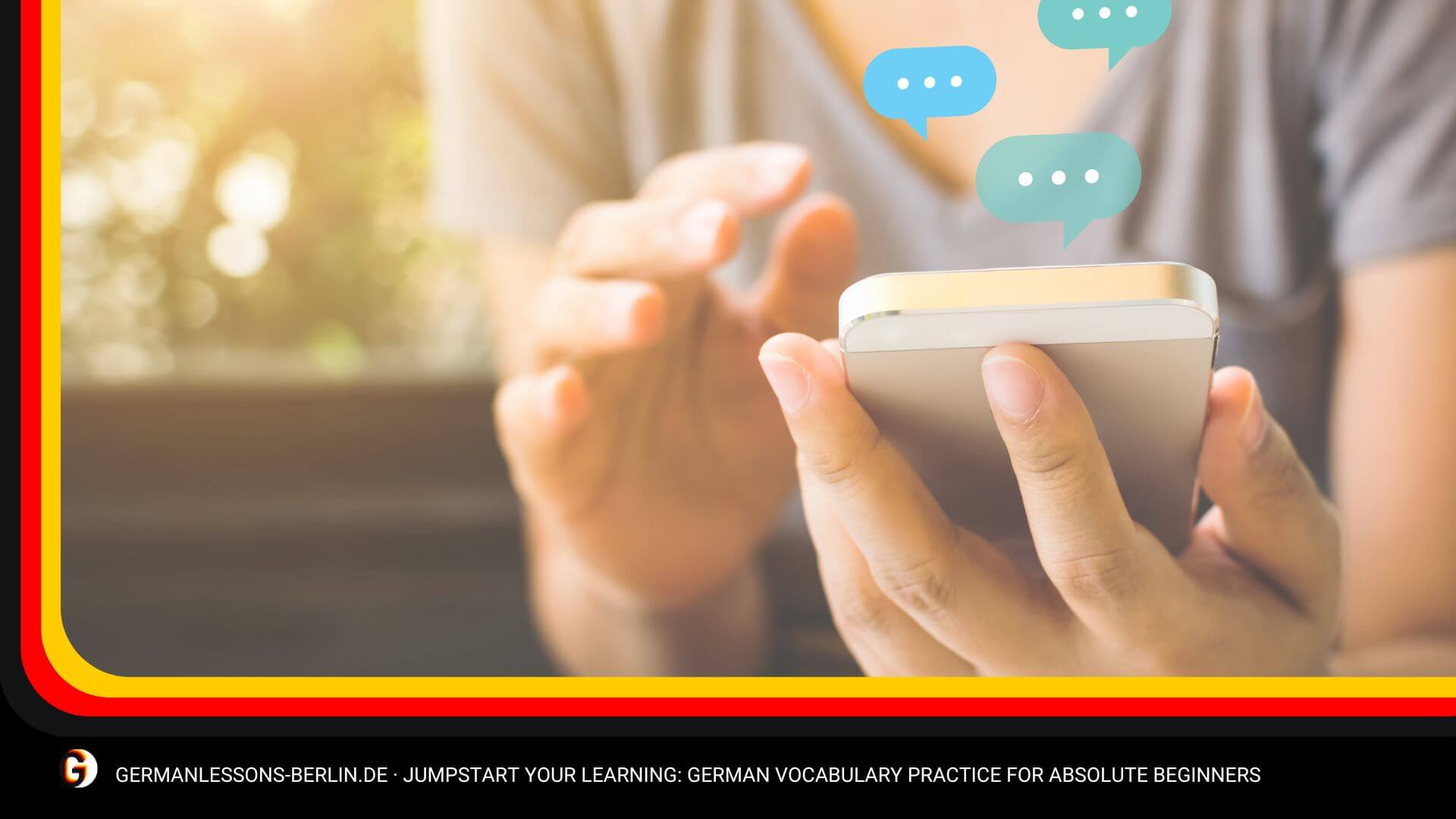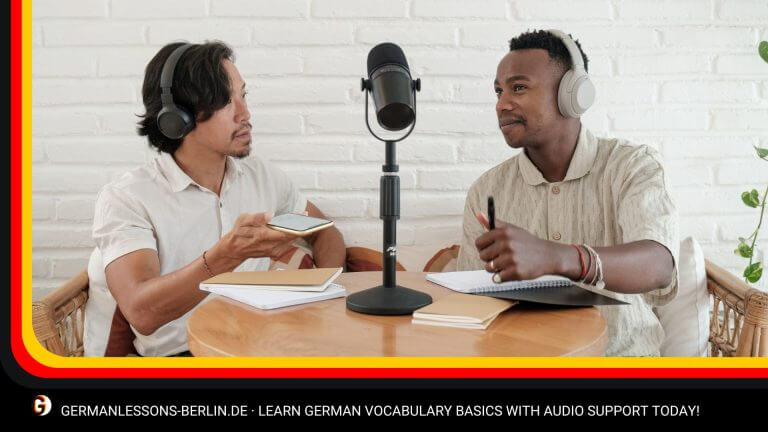Table of Contents
As someone who’s always aspired to conquer the German language, I know the initial steps can seem daunting. But let me tell you, the journey to master beginner German vocabulary is not just thrilling; it’s utterly transformative. Embarking on this linguistic adventure with effective German Vocabulary Practice for Absolute Beginners can set the foundation for a rewarding skill set you’ll cherish for a lifetime. With my firsthand experience, I can vouch for the value of learning German vocabulary and integrating it into daily life.
One of the most exhilarating aspects of German language learning is how it pries open doors to a world rich with incredible literature, history, and a profound cultural landscape. If you’re just starting out and looking to learn German vocabulary from scratch, you’re in luck! A plethora of online tools and resources stands ready to guide you through this fascinating linguistic forest, from the roots of basic words to the canopy of complex sentences.
Let’s begin transforming our enthusiasm into action and learn German vocabulary with a tailored approach that speaks to our everyday needs and learning styles. As we progress, you’ll discover that every new word is a stepping stone towards fluency, and before you know it, you’ll be piecing together sentences with the same ease as putting together a puzzle.
Key Takeaways
- Starting German language learning opens up a new cultural dimension and enhances cognitive skills.
- Utilizing online resources is cost-effective and allows for a personalized learning experience.
- Tools like GermanPod101, HelloTalk, FluentU, and Babbel offer interactive methods to learn German vocabulary.
- Immersing oneself in German through real conversations helps cement vocabulary knowledge.
- Establishing a solid beginner German vocabulary base is essential for day-to-day communication.
- Language learning success is directly correlated with consistent practice and application.
- Every new German word learned enriches your ability to connect with Germany’s cultural richness.
The Allure of German: Why Learn This Influential Language
Embarking on the journey of German language learning is more than just an academic pursuit; it’s a gateway to a wealth of knowledge that spans numerous fields and disciplines. As I’ve delved deeper into this influential language, my appreciation for the cultural richness of German has grown exponentially, offering a spectrum of literature, philosophy, and history that simply can’t be distilled through translation alone.
Understanding German’s Global Impact and Cultural Richness
The German language holds a pivotal place on the world stage, not just as a language of over 130 million people but as a centerpiece of cultural and scientific contribution. Unraveling its complexities allows me to access the minds of great thinkers like Kant and Goethe in their original words, feast on the nuance and meaning that only the authentic tongue can provide. The linguistic structure of German itself is a fascinating reflection of the methodical and deeply philosophical nature of its culture—a cultural heritage that has significantly shaped our world.
The German literary canon brims with masterpieces, but beyond books, it’s a key for unlocking doors to powerful films, evocative music, and groundbreaking scientific research. The country’s historical influences and contemporary leadership, particularly within the European Union, magnify Germany’s linguistic reach, presenting compelling reasons for me—and language enthusiasts like me—to embrace this rewarding lingual challenge.
Benefits of Bilingualism: Boosting Brain Power through Language Learning
My personal experiences align with scientific consensus: learning a language is a potent cognitive enhancer. Through my education in German, the benefits of bilingualism have become vividly apparent. Acquiring a second language has fine-tuned my attention and multitasking capabilities while staving off the typical decline in brainpower that can come with aging.
Whether it is unpacking a complex grammatical structure or finding the perfect word for an expression, I find that language learning, especially one as intricate as German, consistently offers mental gymnastics that sharpen my thinking and response times. The process of navigating a new linguistic framework is more than academic; it is an exercise in cognitive expansion, a mental workout that builds enduring mental agility.
| Areas of Impact | Benefits of German Language Learning |
|---|---|
| Cognitive Development | Enhances memory, concentration, and problem-solving abilities |
| Cultural Understanding | Deepens appreciation for German-speaking cultures and their global contributions |
| Career Advantages | Opens opportunities in global markets, diplomacy, and academia |
| Personal Growth | Fuels self-confidence and the sense of achievement in mastering a complex skill |
As the table showcases, the decision to learn German goes far beyond pragmatic or career-focused reasons—it’s also a journey of personal enlightenment. Every sentence I craft and every conversation I engage in is a testament to the remarkable human capacity for learning and understanding. This language-learning exploration is my testament to the incredible boosting brain power and expanding worldviews one garners from German, and indeed, any new language.
Your First Steps in German: Setting Realistic Goals
Embarking on the path of German language learning, I quickly realized the importance of setting realistic goals. These benchmarks have not only scaffolded my learning experience but ensured that I remain motivated and on track. Let’s dive into why setting achievable objectives is paramount and how it can boost your German language proficiency.
From the onset, my German language practice was about incremental progress. By breaking down the colossal endeavor into digestible portions, each victory, whether a new verb conjugation or a successfully recalled noun, became a cause for celebration. This strategic approach to language learning transformed an overwhelming challenge into a delightful journey of bite-sized achievements.
“A journey of a thousand miles begins with a single step.” – Of course, not originally about language learning, but it resonates profoundly with the German vocabulary venture I’ve undertaken.
So, how do we chart this course effectively? We create smart targets. Let me share with you the structure I use:
| Term | Goals | Examples |
|---|---|---|
| Short-Term | Immediate, achievable objectives to build confidence | Learn common greetings, numbers up to 50, days of the week |
| Mid-Term | Goals that build upon short-term achievements for steady improvement | Engage in a 5-minute conversation, understand a beginner-level German video |
| Long-Term | Aspirational targets that envision where you want your German skills to be | Achieve A2 level, read a short story in German, travel to Germany and use the language |
With these personalized milestones, my language learning process became methodical and empowering. It allowed for measurable achievements without the pressure of unrealistic expectations. Furthermore, this disciplined yet flexible framework has made my study sessions meaningful and, crucially, enjoyable. I am not just learning a language; I’m journeying through the culture, mindset, and essence of the German-speaking world—one goal at a time.
- Identify what you want to achieve weekly, monthly, and yearly in your German practice.
- Be specific with your goals to render them measurable.
- Stay flexible and adjust objectives as needed; it’s your path and your pace.
- Remember, setbacks aren’t failures; they’re opportunities to refocus and persist.
By setting clear objectives, my foray into the German language has evolved from a vague ambition to a structured quest. As I look back at the stepping stones crossed, I see not just the words and rules I’ve mastered, but a landscape of growth, telling a story of personal achievement and linguistic exploration.
Unlocking the Basics: Core German Vocabulary for Beginners
When I took my first steps into the world of German, I quickly grasped that the core German vocabulary for beginners is not just a list of words, but the golden keys to unlocking basic, yet meaningful, conversations. That’s why I’ve made it my mission to share with you today the essential German phrases and the building blocks of language necessary for daily interactions.
Essential German Phrases for Daily Conversations
Whether it’s striking up a casual chat or navigating day-to-day tasks, knowing essential German phrases is a game-changer. The phrase “Wie geht’s?” (How are you?) opens up dialogues, “Danke” (Thank you) shows appreciation, and “Entschuldigung” (Excuse me) is your polite passageway through crowded streets. It’s remarkable how these simple words can bridge gaps and build connections.
Every phrase I learn lets me stitch together sentences that turn into dialogues, transforming me from an observer into an active participant in German society.
The Building Blocks of Language: Common Verbs and Nouns
Diving further, I’ve learned that a handful of common verbs and nouns lay the groundwork for most of the German language. For instance, verbs like “sein” (to be), “haben” (to have), and “gehen” (to go) are essential. Then there are fundamental nouns such as “der Mann” (man), “die Frau” (woman), and “das Kind” (child), which serve as the foundation to form coherent thoughts and sentences.
Here’s a table that I’ve found incredibly useful for visualizing some of the most common verbs and nouns in the German language:
| German Verbs | English Translation |
|---|---|
| sein | to be |
| haben | to have |
| machen | to do |
| sagen | to say |
| German Nouns | English Translation |
| das Haus | house |
| der Freund | friend |
| die Stadt | city |
| das Buch | book |
By mastering these common verbs and nouns, we lay a solid foundation and pave the way toward incorporating more complex ideas and structures into our repertoire.
These building blocks of German not only allow me to convey basic needs and actions but also to construct sentences that express a multitude of thoughts and desires. With every new verb and noun I learn, I find myself one step closer to confident communication. Sharing a “Guten Morgen” (Good morning) with a neighbor or asking for a “Kaffee” (coffee) at a local café feels like a triumph in my language learning journey.
- Focus on learning verbs with clear, everyday applications.
- Pair verbs with nouns to create simple but useful sentences.
- Use these basics to start building dialogues for everyday scenarios.
As I continue to build and expand my German vocabulary, every new word feels like uncovering another piece of a vast linguistic puzzle. And the most thrilling part? Every piece fits perfectly into the expanding picture of my German language proficiency.
Interactive German Vocabulary Exercises
Embarking on the fascinating quest to learn German, I’ve discovered that interactive German vocabulary exercises are not just beneficial; they’re essential. The joy of transforming the German words from my lexicon into living, breathing language use is something quite extraordinary. As I’ve experimented with various learning tools, I found that fun with flashcards is an irreplaceable true classic in language learning.
Fun with Flashcards: A Classic Tool for New Words
Many of us remember using flashcards in school, but who would have thought they’d become my steadfast companions on the German language journey? Fun with flashcards isn’t just a study technique—it’s an invitation to play with words, shuffle meanings, and imprint them deeply in memory. With each card I turn over, I reinforce the bridge between concept and German term, tightening the bolts of my burgeoning language skills.
In the digital age, flashcards have evolved beyond their paper ancestors, becoming vibrant and engaging tools that can be used on-the-go. Interactive apps allow me to slip learning into daily life, turning a coffee queue or a subway ride into a mini tutoring session. I’ve gathered here some reasons why these visual aids are such powerful learning allies.
Every flashcard is a tiny window peeking into a new dimension of German language—each new word is an adventure waiting to happen.
One of the best parts about flashcards is their adaptability; they meet me at my pace and cater to my unique learning style. Whether I’m repeating tricky pronunciation or drilling complex conjugations, this method continues to prove itself endlessly versatile.
| Flashcard Type | Advantages | How I Use Them in My German Studies |
|---|---|---|
| Traditional Paper Cards | Tactile; Portable | I create custom flashcards for hands-on learning during transit. |
| Digital Flashcards | Highly Interactive; Customizable | I use apps to incorporate multimedia cues like sounds and images for a richer learning experience. |
| Spaced Repetition Cards | Smart Algorithm for Retention | I rely on this system to review vocabulary just before I’m about to forget it, reinforcing my memory. |
- Utilize both digital and physical cards for a holistic approach.
- Incite creativity by crafting personal, memorable flashcards.
- Engage with the spaced repetition technique for better retention.
I relish the satisfaction of swiftly responding to a flashcard prompt with the correct German word, the moment mingling with the reassurance that I am, indeed, making progress. This compact format of learning not only fits seamlessly into my lifestyle but manifests as vibrant streaks of knowledge in my conversations.
Incorporating German into Your Daily Routine
Learning a new language like German can be a thrilling and enriching experience. But as I’ve discovered, vocabulary practice for beginners isn’t just about hitting the books, it’s about weaving German into my daily routine. Integrating the language into the fabric of my regular activities has transformed passive memorization into dynamic, living knowledge, fuelling my journey towards fluency.
For instance, during my morning runs, instead of my usual playlist, I plug into German audio lessons. Each stride is timed to a new word or phrase, embedding the rhythm of the language into my muscle memory. At first, I worried it might be overwhelming, but it became a refreshing way to jumpstart my mind each morning.
By weaving German practice into actions I perform daily, I’ve turned every moment into an opportunity to learn—making mundane tasks like waiting in line or doing chores become mini language lessons.
Another transformative habit I cultivated was switching my phone and computer language settings to German. It forced me to interact with technology using the German vocabulary I had been learning. Admittedly, there was a slight learning curve at first, but the payoff has been immense in reinforcing my command of everyday terms.
Here’s a table highlighting some daily routines and how I integrate German practice:
| Daily Activity | Integration of German Practice | Outcome |
|---|---|---|
| Morning Exercises | Listened to German podcasts or songs | Improvement in language comprehension and pronunciation |
| Commuting | German audio lessons or speaking practice with conversational bots | Enhanced active use of German and better speaking confidence |
| Leisure Reading | Reading German articles/blogs or books with parallel text | Expanded vocabulary and increased familiarity with sentence structures |
| Cooking | Following recipes in German | Learned food-related vocabulary and gave a cultural context to the language |
| Evening Downtime | Watching German TV shows or movies with subtitles | Improved listening skills and cultural understanding |
Engaging with German through these daily tasks has not only solidified my verbal skills but also heightened my cultural appreciation of the nuances that make German unique. These regular, small doses of language encounters encourage me, a beginner, to stay consistent and enthusiastic about my progress.
- Pair German vocabulary practice with everyday habits to enhance language retention.
- Incorporate technology by setting devices to the German language mode.
- Replace passive activities with language learning opportunities, like listening to German podcasts instead of music.
The key takeaway from my experience is that blending German into daily routine bridges the gap between classroom exercises and practical, real-world usage. It boosts confidence and fosters an instinctive reaction to thinking and speaking in German without hesitation or translation. And isn’t that the goal of learning a new language?
Free Online Resources to Enhance Your German Vocabulary
As an aspiring polyglot, I’ve had my fair share of experiences with language apps and websites, and I’ve discovered that there are abundant free online resources to enhance German vocabulary. The convenience of these platforms is immeasurable, as they provide opportunities to learn and practice anywhere and anytime. The beauty of the digital age is that it caters to self-paced learners like me, offering resources tailored to individual needs and proficiency levels. So, allow me to share some of the tools that I found instrumental in expanding my German lexicon.
Language Apps and Websites: Convenient Learning Platforms
Among the myriad of digital offerings, certain language apps stand out for their efficiency and engaging content. GermanPod101, for instance, has been a cornerstone of my German studies. With its extensive library of audio and video lessons, I’ve been able to mimic native pronunciations and learn vocabulary relevant to real-life conversations.
For news buffs, Deutsche Welle not only keeps me abreast with global happenings but also serves as a linguistic goldmine. I’ve traversed their site many times, immersing myself in the language through their tailored German courses and interactive exercises. The practical, up-to-date material they offer keeps my German vocabulary fresh and connected to the pulse of the modern world.
Then there’s Babbel, which has a structured and user-friendly interface that gradually builds my knowledge. It’s like assembling a vocabulary puzzle; each lesson snaps into place, forming a clearer picture of the language. Babbel has helped me navigate through new words, enabling me to practice them in thematic contexts which enhances my memory and recall.
Each of these platforms proudly takes its place in my daily routine, turning my device into a portable classroom. They bridge the gap between solitary study and interactive learning remarkably well. Yet, there’s more to these sites than just vocabulary—they open windows to German culture and encourage me to engage with the language on a personal level.
Unlocking the treasure trove of these resources transformed my study time into a journey of enjoyable discovery, rather than a mere academic obligation.
Now, let’s take a more organized look at how I maximize these resources:
| Resource | Key Features | My Experience |
|---|---|---|
| GermanPod101 | Audio/Video Lessons, Vocabulary Lists | I tune into their podcast-like lessons during my commute, absorbing the language in context. |
| Deutsche Welle | Online Courses, News in German | I read articles to stay informed while picking up new vocabulary. |
| Babbel | Interactive Conversations, Grammar Practice | The app’s guided learning keeps me on track with my grammar and vocabulary goals. |
These learning avenues allow me to structure my German studies in a way that suits my life. No rigid schedules, no monotonous drills—just practical, engaging learning that fits into my daily flow. And the best part? It costs me nothing but time and dedication. I’m continually impressed at the wealth of free online resources available that genuinely make a difference in the way I enhance my German vocabulary.
- Explore a variety of language apps to find the perfect match for your learning style.
- Take advantage of structured courses and real-world application exercises.
- Remember, consistency is key in language learning, and these resources make it accessible.
Without a doubt, technology has revolutionized the way we access information and learn new skills. For someone passionate about languages, this era could not be more opportune. It’s time to embrace these platforms and see just how far we can stretch the boundaries of our German linguistic abilities. Auf geht’s!
Audio and Video Aids: German Listening and Pronunciation Practice
Delving into the world of German listening practice, I’ve found immense value in using audio and video aids that provide a multifaceted approach to learning. There’s something profoundly useful about hearing the language in action—it’s as if the rhythmic patterns and sounds begin to naturally imprint themselves onto my brain. Moreover, German pronunciation practice becomes more effective when you have the opportunity to mimic native speakers and properly hear the nuances of their accents.
Listening is one of the core skills in language acquisition, and authentic audio and video aids serve as a portal to the pulsating heart of real-world German use.
Digital resources have revolutionized the way I fine-tune my German auditory skills. YouTube, for instance, is a treasure trove of educational content where I uncover tutorials for perfecting pronunciation and gain exposure to various dialects across Germany. Equally transformative are podcasts dedicated to German learners, where the tempo and vocabulary are tailored to different levels of proficiency.
Let me share with you a table that categorizes some of the audio and video aids I leverage for German listening practice:
| Resource Type | Description | Benefit to My Learning Journey |
|---|---|---|
| German-Language Podcasts | Portable audio lessons crafted to teach German systematically. | I gain a sense of the language’s rhythm and flow while learning context-relevant vocabulary. |
| German Pronunciation Tutorials on YouTube | Videos that focus on teaching correct articulation and sounds in German. | The visual cues and repetitive drills assist me in mastering tricky pronunciation peculiarities. |
| German Films and TV Shows with Subtitles | Entertainment content in German, providing both listening and reading exposure. | I’ve begun to recognize spoken words faster, while subtitles assist with understanding and context. |
| German Music and Lyrics | Engaging with the German language through contemporary and classic music. | Music helps me remember phrases and words through catchy melodies and repeated choruses. |
But it’s not merely about passive listening; I actively engage with these resources by repeating phrases, singing along with songs, and even daring to shadow speakers in real-time. This active engagement ensures that the learning process is never one-directional and helps in cementing my speaking skills.
- Find content that interests you, as passion drives persistence in learning.
- Use media like German news broadcasts to also stay informed while practicing.
- Consider joining online communities or forums where others share resources and tips.
The addition of these rich media forms into my study routine has been a game-changer, enabling me to grow more comfortable with the sounds of German. It’s thrilling to find myself recognizing words and phrases in conversations, which, in turn, fuels my desire to dive even deeper. The path to German fluency is one filled with diverse sounds and visions, and these audio and video aids are my steadfast guides.
Connecting with Native Speakers: The Power of Language Exchange
When I began incorporating language exchange into my regimen, the true potency of connecting with native speakers became evident. This immersive approach pivoted my German language practice from the theoretical to the actionable. By engaging in conversation with individuals for whom German is the mother tongue, my proficiency underwent a noticeable transformation.
There’s nothing quite like discussing everyday events or personal interests with someone who knows the intricacies of the language.
I’ve found that platforms like HelloTalk and italki are perfect for facilitating these exchanges. The beauty of these services lies in their mutual benefit—while I practice German, my speaking partners gain the chance to refine their English skills. Therefore, it’s not just about learning; it’s a cultural bridge that fosters understanding and deepens the global connection.
HelloTalk, with its messaging and voice recording functionalities, proved to be an extraordinary tool, as it allowed me to converse with German speakers regularly. Meanwhile, italki offered a taste of structured learning through informal tutoring and chatting with peers, enriching my vocabulary and comprehension even further.
| Platform | Features | Benefits for My Language Practice |
|---|---|---|
| HelloTalk | Text and voice messaging, language correction tools | Real-time conversation practice, immediate native speaker feedback |
| italki | One-on-one tutoring, language partner community | Customized lessons and cultural insights, expanding colloquial knowledge |
As I navigated through this journey, the interactions not only allowed me to pick up colloquial phrases but also to grasp the cultural subtext that often gets lost in translation. It’s a pleasure to exchange stories about local festivals or to debate the subtleties of regional dialects.
- Frequent discussions with native speakers elevate language skills beyond textbook knowledge.
- Every conversation is an opportunity to refine pronunciation and listening abilities.
- The richness of direct cultural exchange is irreplaceable for authentic language comprehension.
The sway of this hands-on approach to German language practice cannot be understated. Engaging in language exchange has not just been a boon to my conversational skills; it’s been a joyous foray into a living, breathing linguistic ecosystem. As each exchange unfolds, the nuances and the rhythm of German become more intuitive, thereby strengthening my connection to both the language and its speakers.
Real-life Application: Using German in Practical Contexts
As I’ve ventured deeper into the practical application of the German language, I’ve found that the real test of my progress isn’t confined to the pages of a textbook. It’s out there, in the hustle and bustle of everyday life, where I truly mingle with the essence of authentic language use. The experience of navigating in German in various practical contexts such as supermarkets, restaurants, and cities, has not only been a substantial confidence booster but a cornerstone in achieving proficiency.
Navigating Supermarkets, Restaurants, and Cities in German
Walking through German supermarkets, I’ve wielded my language skills to decipher labels, interact with staff, and, most importantly, make informed purchases. The aromatic bakeries, vibrant produce sections, and busy checkouts became my classrooms, each interaction an opportunity to engage and learn. Similarly, the warm glow of restaurants presented me with a stage to practice, from ordering a meal to discussing dietary preferences.
Each phrase spoken, from “Ich hätte gerne diesen Apfel” to “Könnte ich die Speisekarte sehen?”, has been a building block towards greater linguistic fluency.
In the winding streets of German cities, I’ve honed my vocabulary and directional prowess, asking for and understanding directions—real-life exercises that fast-tracked my command of the language in ways no flashcard drill could ever replicate. These experiences reinforced the practical use of every word and phrase I had learned, anchoring them in memory fuelled by the adrenaline of necessity.
| German Phrases | Use Case | Outcomes |
|---|---|---|
| Wo finde ich Milch? | Locating items in a grocery store | Gained confidence in asking for assistance |
| Ich hätte gern das Tagesgericht. | Ordering the daily special in a restaurant | Practiced conjugating verbs in the first person |
| Können Sie das bitte wiederholen? | Asking for repetition when directions are unclear | Improved comprehension and listening skills |
| Ist dieser Sitz frei? | Understanding and using polite forms in public transportation | Learned to navigate social interactions |
A list of everyday activities and their German phrases not only serves as a vocabulary list but as a passport to cultural immersion:
- Guten Morgen, ein Kaffee bitte – A simple morning ritual that earns a smile from the local barista.
- Könnten Sie mir helfen? – A phrase that reveals the helpful nature of German speakers and furthers the exchange of words.
- Wie viel kostet das? – An essential question in shops that teaches the nuances of German currency and numbers.
The very essence of using German in practical contexts is about throwing away the comfort blanket of rehearsed scenarios and embracing the unpredictable nature of real life. It’s about accepting that mistakes will be made, but each one will craft you into a more capable speaker and navigator of the German language.
In conclusion, understanding German’s practical application has exponentially enriched my language learning journey. Every venture into public spaces, armed with a mental glossary of phrases, has invariably molded my ability to navigate in German with increasing confidence and contextually grounded knowledge.
Tracking Your Progress: Setting Milestones in Language Learning
As I journey through the intricate process of learning German, I’ve come to realize the importance of tracking progress in German. It’s akin to planting a garden; as I sow each new word and phrase, I eagerly watch for signs of growth, looking forward to the blossoms of fluency and the fruits of conversation. To guide my efforts and maintain momentum, I’ve learned the value of setting milestones in language learning that act as checkpoints on this exciting journey.
Milestones do more than mark progress; they provide structure and motivation. As I set these targets for my German proficiency, I remain driven, knowing each milestone is a step closer to my goal of fluency. With careful planning and the support of various language learning resources, these points of achievement become moments of celebration, encouraging continued enthusiasm and dedication.
These milestones range from mastering a set number of vocab words to engaging in meaningful conversation. Here’s how I structure them to capture the full spectrum of my learning experience:
| Milestone Category | Example Milestone | Method of Tracking |
|---|---|---|
| Basic Vocabulary | Learning 300 common German words | Flashcard proficiency checks |
| Grammar Comprehension | Understanding all regular verb conjugations | Completion of online exercises with 90% accuracy |
| Listening Skills | Comprehending a simple German podcast episode | Listening exercises followed by a comprehension quiz |
| Speaking Ability | Holding a 5-minute conversation with a native speaker | Recording sessions and receiving feedback from language partners |
| Reading Proficiency | Reading and summarizing a short article in German | Writing a brief summary and getting it reviewed by peers |
| Writing Competence | Composing a 200-word email or diary entry | Peer reviews and corrections via language exchange forums |
Each milestone achieved adds another layer of depth to my understanding and capability in German. As I look back over the milestones I’ve set and met, I see a roadmap of my growth, each point a celebration of new learning and a foundation for future progress.
Tracking my progress is not just about ticking off lists; it’s about the personal victories, the moments where I realize a concept I once found confusing is now a familiar friend.
- Utilize progress bars in language apps to visually track vocabulary acquisition.
- Record and listen to your own German speech periodically to note improvements.
- Partake in online German challenges or tests to validate grammar and vocabulary.
- Consistently update a learning journal with personal reflections and achievements.
By setting milestones and employing a mix of language learning resources, I’ve found that my German studies become more focused and rewarding. It’s the small triumphs, like ordering a coffee effortlessly or finally grasping the nuances of German sentence structure, that remind me of how far I’ve come—and how much more I can achieve.
Conclusion: Embarking on Your German Language Learning Journey
As I reflect on my path of mastering German vocabulary for beginners, I am filled with a sense of fulfillment and excitement. The German language learning journey is indeed a remarkable adventure, punctuated with moments of triumph as each new phrase becomes a part of my growing linguistic arsenal. The arsenal of German vocabulary exercises available online played an instrumental role in this process, offering a wealth of interactive tools that transformed my studies from a mere pursuit to a vibrant, engaging, and deeply rewarding part of my life.
Throughout this journey, setting achievable goals—and celebrating each accomplishment, no matter how small—gave me the confidence and motivation to continue. Connecting with native speakers breathed life into the phrases and syntax I learned, embedding them into real-world contexts that added depth and color to my conversations. It’s in these authentic interactions that I found the genuine essence of the German language, and it is there that my learning took on new meaning.
In looking ahead, I know that this is just the beginning of an ongoing quest towards fluency—I’m eager to take my German vocabulary for beginners and build upon it, layer by layer, word by word. For those of you embarking on your own German language learning journey, remember that every resource, every exercise, and every conversation is a step forward. Take each one with enthusiasm and let the rich history and culture that unfolds inspire you onward. Auf eine erfolgreiche Reise!
FAQ
Why should I choose to learn German as my next language?
Learning German provides access to a world of rich cultural heritage and is a language of significant global impact. It opens up opportunities to understand works of art, literature, and philosophy in their original language.
How does becoming bilingual in German benefit my brain?
Bilingualism, including learning German, has been shown to enhance cognitive abilities. It can improve memory, problem-solving skills, and the ability to multitask, promoting mental agility and healthier cognitive function over time.
What are the most important first steps when starting to learn German?
The first steps include setting realistic goals to keep you motivated, learning essential phrases for daily conversations, and familiarizing yourself with common verbs and nouns that form the foundation of the language.
Where can I find resources to practice German vocabulary interactively?
There are various online resources such as interactive vocabulary flashcards, language learning apps like Babbel, and comprehensive learning platforms like GermanPod101. These provide engaging methods to learn and practice new words.
How can I incorporate German into my daily life for effective practice?
You can weave German into your daily routine by listening to German audio lessons, using apps to learn new words, engaging with conversational bots, or labeling objects around your home in German.
Are there free online resources available to help me enhance my German vocabulary?
Yes, there are many free resources available online, including language apps like Duolingo, websites such as Deutsche Welle’s language learning section, and various podcasts and YouTube channels dedicated to German learners.
How do audio and video materials help with German language learning?
Utilizing audio and video materials can significantly improve your listening skills and pronunciation. They provide exposure to the sounds and intonation of the language, as well as contexts and accents used by native speakers.
What is the best way to practice speaking German with native speakers?
Language exchange platforms like HelloTalk or iTalki are excellent ways to connect with native German speakers. They enable casual conversation practice, which is vital for improving fluency and gaining cultural insights.
Can you give examples of practical contexts where I can use German?
Absolutely! You can practice your German in real-life situations such as shopping in supermarkets, ordering food in restaurants, or asking for directions while exploring cities. These activities reinforce practical use of vocabulary and phrases.
How should I track my progress while learning German?
Set consistent milestones, such as completing sets of vocabulary, having conversations on new topics, or passing language tests. These will help monitor your improvement and keep you inspired to continue learning.








